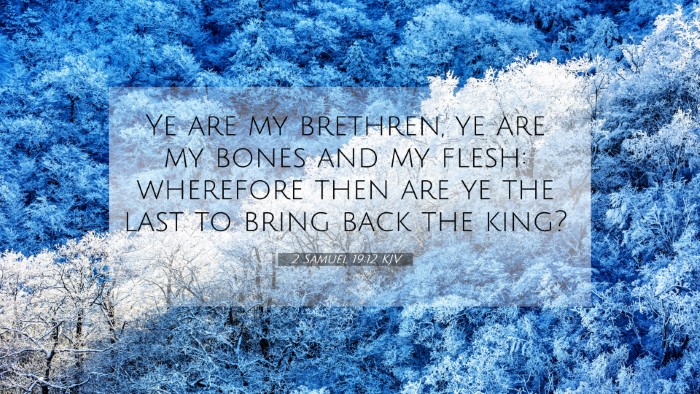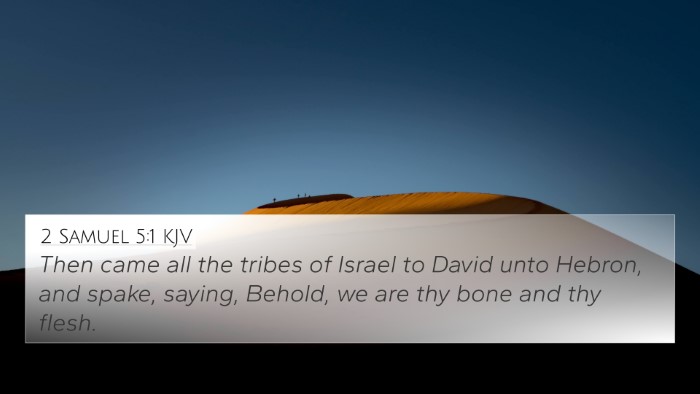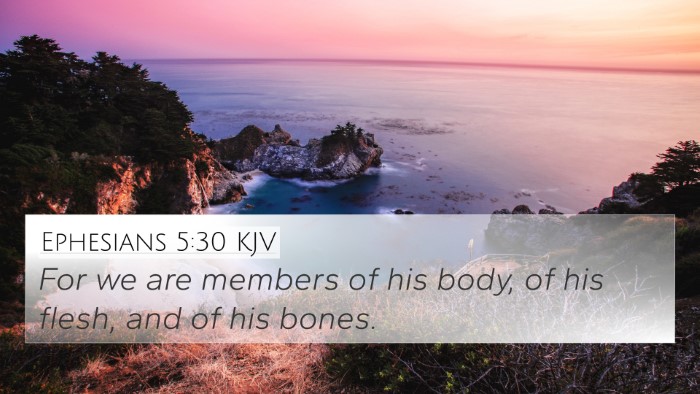Meaning of 2 Samuel 19:12
2 Samuel 19:12 states, "Ye are my brethren; ye are my bones and my flesh: wherefore then are ye the last to bring back the king?" This verse captures a poignant moment during King David's return to Jerusalem after his exile, emphasizing themes of unity, responsibility, and familial bonds.
Contextual Overview
This verse occurs in the aftermath of Absalom's rebellion, where David had to flee from Jerusalem. Upon his return, David seeks to reconcile with his people. The plea highlighted in this scripture underscores David's relationship with his subjects, portrayed as family, invoking feelings of loyalty and solidarity.
Commentary Insights
- Matthew Henry: Henry emphasizes that David’s appeal to the men of Judah stems from a sense of shared identity. He points out that being "my bones and my flesh" indicates the deep connection and mutual obligations between David and his warriors.
- Albert Barnes: Barnes notes that David addresses the people of Judah directly, questioning their delayed support. He interprets this as a call to their loyalty, reminding them that they should be the first to act in favor of their king due to their kinship.
- Adam Clarke: Clarke's commentary elaborates on the emotional aspects of David's statement, likening it to the ties of a family. He suggests that David’s words serve to inspire unity among the people during a tumultuous period.
Thematic Connections
In the exploration of familial ties and communal responsibility, this verse connects to various other passages within the Bible:
- Genesis 29:14: "And Laban said to him, Surely thou art my bone and my flesh." - A declaration of kinship emphasizing a shared bond.
- 1 Chronicles 11:1: "Then all Israel gathered themselves to David unto Hebron, saying, Behold, we are thy bone and thy flesh." - The reaffirmation of loyalty and unity among David’s followers.
- Matthew 12:48-50: "But he answered and said unto them, Who is my mother? and who are my brethren? ... For whosoever shall do the will of my Father... the same is my brother, and sister, and mother." - Jesus redefines familial ties in spiritual terms, emphasizing allegiance to God over biological relationships.
- Romans 12:5: "So we, being many, are one body in Christ, and every one members one of another." - A transition from physical kinship to spiritual unity in the body of Christ.
- Ephesians 4:3: "Endeavoring to keep the unity of the Spirit in the bond of peace." - Stressing the importance of maintaining unity among believers.
- Philippians 2:2: "Fulfill ye my joy, that ye be like-minded, having the same love, being of one accord, of one mind." - Paul encourages the church to unity and mutual support.
- Hebrews 10:24-25: "...consider one another to provoke unto love and to good works: Not forsaking the assembling of ourselves together..." - Encourages the community to support and uplift one another.
Cross-Referencing Biblical Texts
The concept highlighted in 2 Samuel 19:12 relates to broader biblical themes such as unity and familial responsibility. For a thorough study on how these themes are interwoven through scripture, below are some tools and methods for cross-referencing biblical texts:
- Tools for Bible Cross-Referencing: Utilizing a Bible concordance can help locate related verses within both the Old and New Testaments, clarifying thematic connections.
- Bible Cross-Reference Guide: This resource offers systematic connections between verses that echo similar themes, enhancing comprehension.
- Cross-Reference Bible Study: Engage in detailed studies focusing on specific themes and observe how verses support one another.
- Comprehensive Bible Cross-Reference Materials: Accessing academic resources and commentaries deepens understanding of the interconnections within scripture.
Conclusion
The declaration of kinship by David not only serves a historical narrative purpose but also reflects deeper spiritual truths regarding community and belonging. As modern readers, understanding these connections enhances our grasp of scriptural teachings and encourages an active engagement with the text. The familial ties expressed in the Bible resonate beyond cultural contexts, affirming that unity should prevail in all communities of faith.






